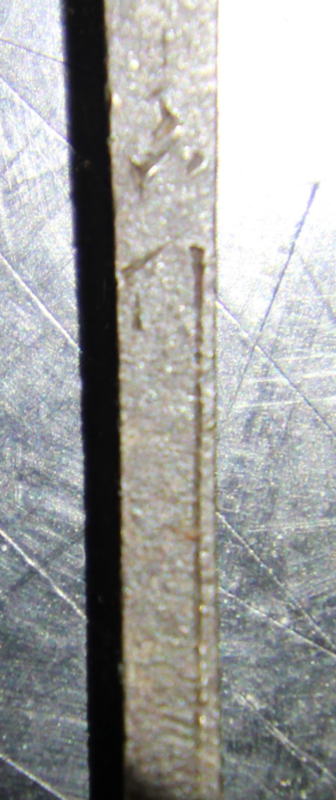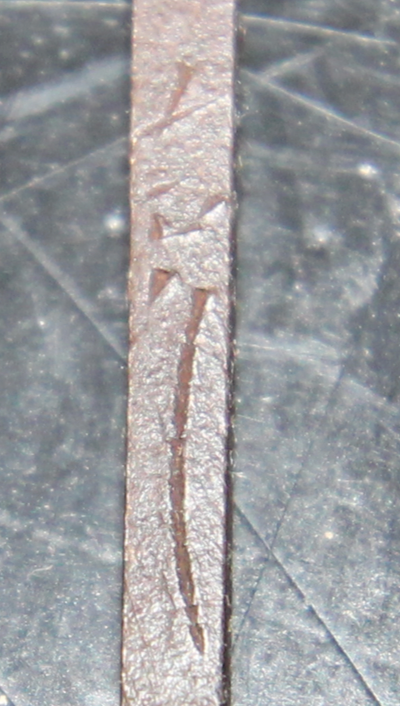
John C
Members-
Posts
2,752 -
Joined
-
Last visited
-
Days Won
18
Content Type
Profiles
Forums
Events
Store
Downloads
Gallery
Everything posted by John C
-
Luke: Is it real as in Japanese? Probably, however you should consider all signatures fake until verified by a shinsa assessment. Just a side note: that seller works with a well known seller in the US. They generally sell real stuff, however there will usually be some issue; i.e., gimei signature, ware, etc. Think used car salesman - it's real, but look at the pictures carefully. just my opinion, John C.
-
Matt: Here are a couple of sites that will answer many of your questions. http://www.japaneseswordindex.com/koa.htm http://ohmura-study.net/998.html John C.
-
Let me know when your selling days begin John C.
-
-
Sweet! That's excellent. Number 36 on the list. I am currently in the process of translating the inspector marks. Thank you very much, John C.
-
-
Interesting idea. The inside bottom is actually purposefully scratched in such a way that it could probably light a "strike anywhere" match. Not sure how it would have been secured to the person. The only attachment point is the other side of the chain hook on the latch screw. John C.
-
Thanks, Piers. It gives me another avenue to try to figure it out. John C.
-
Piers: I got it off of ebay. Not sure if it is Japanese. It was marketed as a sagemono, however it doesn't seem to be the right shape or weight for that. To me, it just seems to be some sort of soldered brass case. Probably from the 1920s-1940s? It was cheap enough and interesting enough to take a chance on it. John C.
-
- 1 reply
-
- 5
-

-

-

-

-
I just picked up this brass compartmentalized medicine/cosmetic holder. It has an odd shape with a notch half way down on one side. To secure into an obi, perhaps? The top screws off and the "egg" opens up. It seems a little too bulbous and heavy to be a sagemono, however I cannot think what else it would be or how it would be used. Has anyone seen this shape/style before? I don't believe it's too old, but not real recent either. John C.
-
Okay. Got it. So the presence of the fukurin would be a key indicator. Thank you. John C.
-
Speaking of sanmai...and in an effort to train the eye, would this be an example of sanmai? I think I can see a copper (?) core and a thin layer of iron or steel. John C.
-
Yes. I'm trying to build a picture of which inspectors worked at which times during production. This particular inspector, for example, also worked on Meiji 23 swords with a slightly different stamp (see below). John C.
-
Hello: I've been trying to decipher a few seal script (see pic 1). I think I have figured out the first radical is "te", "ta", or "shu" meaning hand (see pic 2) and the second radical as Mura, Kuni, Sato, Sumi, or Tomo (see pic 3). But how would I read those together? It's probably a shortened inspector name. Thank you, John C.
-
Here is a good shot of Colin's observations: the over-paint/gilding, the over-punch, and the terrible nanako job. Thanks Colin. John C.
-
RE: Which tsuba schools incorporate rectangular/square hitsu-ana?
John C replied to Iaido dude's topic in Tosogu
-
@Bruce Pennington I know you have this in the stamp doc already, however I thought you might like another link to one. The bottom mark may be a bit more clear in this one. John C. https://www.ebay.com/itm/305777529373?
-
Yes, though no one is sure exactly what it means. The numbers range from 2 characters to 6 and are sometimes preceded by a katakana letter. Different arsenals/smiths tended to use different colors. For example, almost all souvenir swords are two numbers with black paint; RJT smith Kanehide used green on one side and aqua blue on the other. Personally, I think there is a little more to it than just "assembly" but I am in the minority. John C.
-
I picked up a fairly inexpensive kogatana with a hamon (I can see nie under a loupe). It is signed, however it has been polished to death and is unreadable. My question is whether or not age can be determined by the presence of a hamon? Or at least, were there certain eras when water quenched kogatana were more prevalent? Thank you, John C.
-
I'll give this another shot with some added photos. This is the best I can do with the camera I have. Hopefully, someone can make it out. I have separated the kanji in order to get closer shots. The first pic is the first character; the second pic is the second. Thanks for trying to figure this out. Much appreciated. John C.
-
I'm interested in learning from this thread, so let's not get it locked! Just to clarify my learning goals - I agree that if one is learning for learning sake, one can study the best artists to determine what makes a master a master or a journeyman a journeyman. But I'm not there yet. I would not graduate high school and go straight to Med school. I would first study basic science, physiology, and chemistry, get proficient there, then go on to Med school, then do a residency, then become a doctor. I prefer to learn in stages. John C.
-
Franco: I, for one, appreciate the exercise. Knowledge is useless if it can't be put into practice - that's why schools and universities give tests. I also tend to live in mediocrity financially, so this level of difference is right up my ally and will hopefully assist me in not wasting too much money on pure junk. John C.
-
Hmmm. Might be a trick question. They look similar to me, however the one on the left seems a bit cleaner and more balanced to me. John C.





















